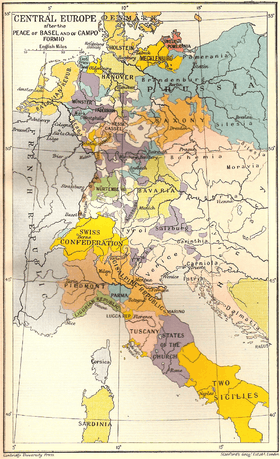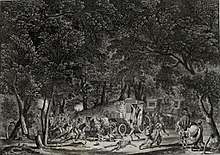Second Congress of Rastatt
The Second Congress of Rastatt, which began its deliberations in November 1797, was intended to negotiate a general peace between the French Republic and the Holy Roman Empire, and to draw up a compensation plan to compensate those princes whose lands on the left bank of the Rhine had been seized by France[1] in the War of the First Coalition. Facing the French delegation was a 10-member Imperial delegation made up of delegates from the electorates of Mainz, Saxony, Bavaria, Hanover, as well as the secular territories of Austria, Baden, Hesse-Darmstadt, the prince-bishopric of Würzburg, and the imperial cities of Augsburg and Frankfurt.[2] The congress was interrupted when Austria and Russia resumed war against France in March 1799 at the start of the War of the Second Coalition, thus rendering the proceedings moot. Furthermore, as the French delegates attempted to return home, they were attacked by Austrian cavalrymen or possibly French royalists masquerading as such. Two diplomats were killed and a third seriously injured. The congress was held at Rastatt near Karlsruhe.
 Map shows Central Europe 1797 | |
| Context | Failed congress to compensate the German princes dispossessed by the War of the First Coalition. |
|---|---|
| Drafted | 1797–1799 |
| Location | Rastatt |
| Parties |
|
Rastatt

(Musée de la Révolution française).
Widespread disagreement among the German delegates precluded the drawing up of a compensation plan but two important results were nevertheless achieved during the first months of the congress: the official recognition of the loss of the entire left bank to France, and the recognition that any compensation plan should be based on the secularization of the ecclesiastical states of the Empire.[3] It is on this basis that deliberations on a compensation plan will resume after the signing of the Treaty of Lunéville in February 1801.
The congress also had a sequel of some interest. As the three French representatives were leaving the town in April 1799 they were waylaid, and two of them were assassinated by some Hungarian soldiers. The origin of this outrage remains shrouded in mystery, but the balance of evidence seems to show that the Austrian authorities had commanded their men to seize the papers of the French plenipotentiaries in order to avoid damaging disclosures about Austria's designs on Bavaria, and that the soldiers had exceeded their instructions. On the other hand, some authorities think that the deed was the work of French emigrants, or of the party in France in favour of war.[1]
Since it was expected that a major territorial reorganization of the Empire would result from the congress, it was followed with considerable interest, even passion, throughout Germany. Although indecisive from a diplomatic point of view the Congress brought high society to the area of Baden and was responsible for resurgence of interest in the spa town of Baden Baden.
References
-

- John G. Gagliardo, Reich and Nation. The Holy Roman Empire as Idea and Reality, 1763-1806, Indiana University Press, 1980, pp. 188-189.
- Gagliardo, pp. 188-191.
Further reading
- Ferdinand C. Baur (14 March 2018). Church and Theology in the Nineteenth Century. Wipf and Stock Publishers. pp. 17–. ISBN 978-1-5326-3231-0.
- Eduard Bernstein (4 May 2018). Eduard Bernstein on Social Democracy and International Politics: Essays and Other Writings. Springer. pp. 303–. ISBN 978-3-319-70781-5.
- Elisabeth Boesen; Gregor Schnuer (10 November 2016). European Borderlands: Living with Barriers and Bridges. Taylor & Francis. pp. 83–. ISBN 978-1-317-13978-2.
- Melanson, Terry (2011). Perfectibilists: The 18th Century Bavarian Order of the Illuminati. Trine Day. ISBN 978-1-937584-09-2.
- Frederick Converse Beach; Forrest Morgan; George Edwin Rines; Nathan Haskell Dole; E. T. Roe; Thomas Campbell Copeland (1904). The Encyclopedia americana: a general dictionary of the arts and sciences, literature, history, biography, geography, etc., of the world; editor-in-chief, Frederick Converse Beach ... managing editor, Forrest Morgan ... assistant editors, Nathan Haskell Dole ... Edward Thomas Roe ... Thomas Campbell Copeland ... The Americana company.
- John Emerich Edward Dalberg Acton Baron Acton (1934). The Cambridge Modern History: Planned by Lord Acton. Macmillan.
- Hamish Scott (22 July 2014). The Birth of a Great Power System, 1740-1815. Routledge. pp. 280–. ISBN 978-1-317-89354-7.
- Joachim Whaley (2012). Germany and the Holy Roman Empire: Volume II: The Peace of Westphalia to the Dissolution of the Reich, 1648-1806. OUP Oxford. pp. 739–. ISBN 978-0-19-969307-8.
- Frederick C. Schneid (2005). Napoleon's Conquest of Europe: The War of the Third Coalition. Greenwood Publishing Group. pp. 42–. ISBN 978-0-275-98096-2.
- Jackson J. Spielvogel (1 January 2014). Western Civilization: Volume II: Since 1500. Cengage Learning. pp. 659–. ISBN 978-1-285-43655-5.
- Gregory Fremont-Barnes (June 2006). The encyclopedia of the French revolutionary and Napoleonic Wars: a political, social, and military history. ABC-CLIO. ISBN 978-1-85109-646-6.
- Renger Evert Bruin; Maarten Brinkman (2013). Peace was Made Here: The Treaties of Utrecht, Rastatt and Baden 1713-1714. Imhof. ISBN 978-3-86568-905-4.